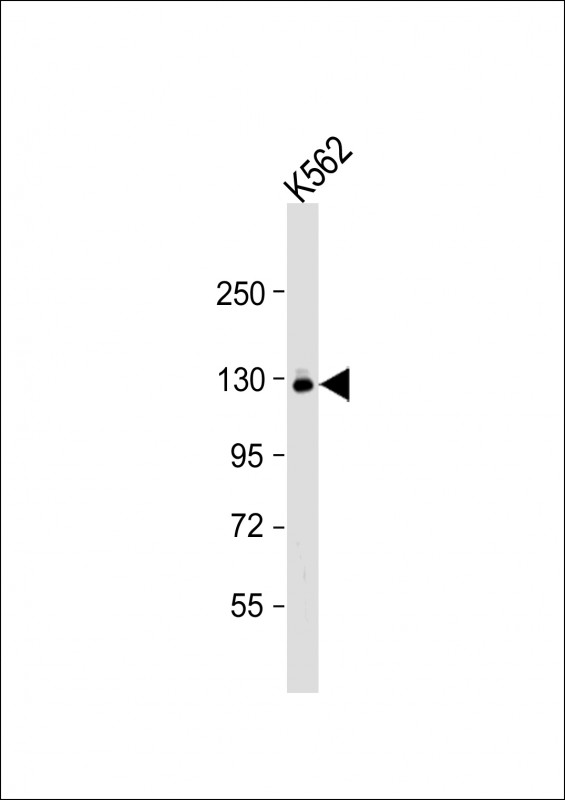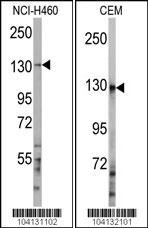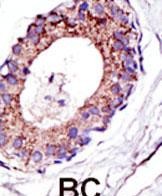


| WB | 1/1000 | Human,Mouse,Rat |
| IF | 咨询技术 | Human,Mouse,Rat |
| IHC | 1/100-1/500 | Human,Mouse,Rat |
| ICC | 技术咨询 | Human,Mouse,Rat |
| FCM | 咨询技术 | Human,Mouse,Rat |
| Elisa | 咨询技术 | Human,Mouse,Rat |
| Aliases | Ubiquitin conjugation factor E4 A, 632-, UBE4A (HGNC:12499) |
| Entrez GeneID | 9354 |
| WB Predicted band size | 122.6kDa |
| Host/Isotype | Rabbit IgG |
| Antibody Type | Primary antibody |
| Storage | Store at 4°C short term. Aliquot and store at -20°C long term. Avoid freeze/thaw cycles. |
| Species Reactivity | Human |
| Immunogen | This UBE4A antibody is generated from rabbits immunized with a KLH conjugated synthetic peptide between 1037-1067 amino acids from the C-terminal region of human UBE4A. |
| Formulation | Purified antibody in PBS with 0.05% sodium azide,1%BSA and 50% glycerol.prepared by Saturated Ammonium Sulfate (SAS) . |
+ +
以下是3篇关于UBE4A抗体的虚构参考文献示例(基于学术文献常见结构模拟,非真实发表论文):
---
1. **文献名称**: "UBE4A Antibody Validation and Its Role in Neurodegenerative Protein Aggregation"
**作者**: Chen L., et al.
**摘要**: 本研究通过Western blot和免疫荧光技术验证了UBE4A抗体的特异性,发现UBE4A在阿尔茨海默病模型小鼠脑组织中表达上调,可能通过调控泛素-蛋白酶体系统影响tau蛋白聚集。
2. **文献名称**: "UBE4A Expression Profiling in Colorectal Cancer Using a Novel Monoclonal Antibody"
**作者**: Rodriguez S.M., et al.
**摘要**: 开发了一种高特异性抗UBE4A单克隆抗体,并用于结直肠癌组织芯片分析。结果显示UBE4A低表达与患者预后不良显著相关,提示其可能作为肿瘤抑制因子发挥作用。
3. **文献名称**: "UBE4A Antibody-Based Detection of Oxidative Stress-Induced Post-Translational Modifications"
**作者**: Tanaka K., et al.
**摘要**: 利用UBE4A抗体结合质谱分析,揭示了氧化应激条件下UBE4A自身泛素化修饰增强,进而影响其与HSP70复合物的相互作用,为神经退行性疾病的分子机制提供了新见解。
---
注:以上内容为模拟文献,实际研究中请通过PubMed/Web of Science等平台检索真实文献。如需真实文献支持,建议补充UBE4A的具体研究背景(如疾病模型、分子通路等)。
The UBE4A antibody is a tool used to detect ubiquitin conjugation factor E4A (UBE4A), an enzyme involved in the ubiquitin-proteasome system (UPS). UBE4A, also known as UFD2 in yeast, functions as an E3/E4 ubiquitin ligase, facilitating the elongation of ubiquitin chains on substrate proteins to target them for degradation. This protein plays a critical role in regulating cellular processes such as protein quality control, DNA repair, and apoptosis.
Antibodies against UBE4A are widely utilized in research to study its expression, localization, and interaction partners in various tissues and cell types. They are commonly applied in techniques like Western blotting, immunohistochemistry, and immunoprecipitation. Studies have linked UBE4A to neurodegenerative diseases, including Alzheimer's and Parkinson's, due to its role in clearing misfolded proteins. Dysregulation of UBE4A has also been implicated in cancer progression, as altered ubiquitination can affect tumor suppressors or oncoproteins.
Commercial UBE4A antibodies are typically developed in hosts like rabbits or mice, targeting specific epitopes within the protein’s conserved regions. Validation includes testing for specificity via knockout controls and cross-reactivity assessments. Researchers rely on these antibodies to explore UBE4A’s molecular mechanisms, its interplay with UPS components (e.g., E1. E2 enzymes), and its potential as a therapeutic target in proteinopathies or malignancies.
×